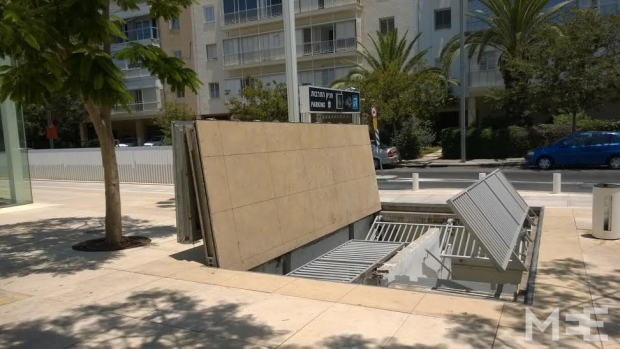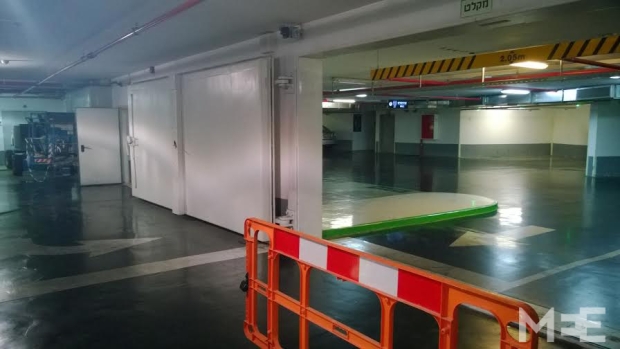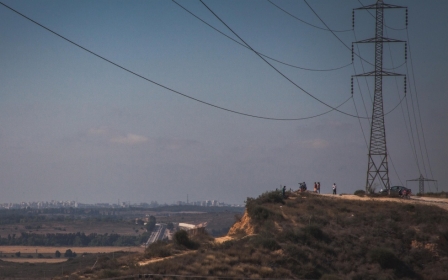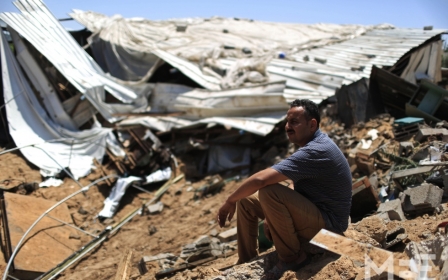Trap doors and bomb shelters in Israel

Business in Israel’s biggest coastal city, Tel Aviv, is suffering today, following recent rocket attacks over the city, but the explosions have failed to shake residents.
At least two rockets from Gaza were intercepted to the south of Tel Aviv by the iron dome overnight, causing sirens to sound, sending residents scurrying into bomb shelters.
The Mediterranean coastal city of about 400,000 people has long been considered the last resort when it comes to attacks from Gaza, and many say they live in a bubble.
But last night, as the spectacular air show was seen over the city, that perception was shattered.
Air raid sirens also sounded around Jerusalem as three explosions were heard over the city.
Today, Prime Minister Benjamin Netanyahu instructed the Israel Defence Force to up the ante and increase the intensity of Operation Protective Edge.
“No target has immunity,” he told troops. Netanyahu wants to prepare Israel for what will be a long campaign.
“We have decided to further increase the assault on Hamas and the terrorist organisations in Gaza. The IDF is prepared for all possibilities. Hamas will pay a heavy price for firing at Israel's citizens. The security of Israel's citizens is our primary consideration.”
“Our military is strong, the home front is steadfast and our people are united. This combination is our response to the terrorist organisations that want to attack us,” said Netanyahu.
Defence Minister Moshe Ya’alon warns the operation will be expanded.
“The campaign against Hamas will be expanded in the coming days and the prices the organisation will pay, will be very heavy.”
Readying the bomb shelters
As in Jerusalem, Tel Aviv is readying its public bomb shelters for a lot of activity over the coming days and weeks.
The Habima National Theatre’s underground car park in central Tel Aviv doubles as a bomb shelter. It reaches four levels below ground. The levels serve as shelter during an attack, while an adjoining air tight room can be used when there are more serious chemical attacks.
During yesterday’s sirens, people rushed underground and sheltered in the car park.
The car park’s facilities manager Or Gabai told Middle East Eye that there were nearly 100 people who took refuge in the shelter last night. He said it wasn’t hysterical, and much more orderly than he’d expected.
He showed MEE around the underground shelter, pointing out the air filter room, used in the event of more serious, chemical attacks and the shower room.
Above ground he also showed MEE the concealed trap doors in the expansive courtyard. There are six of them and they take six minutes to fully open up, revealing steps leading from the courtyard to the shelter.
“People wouldn’t normally know the doors are there, they’d walk straight over them in peaceful times.”
He said he wasn’t there during the strike last night but said people who did use the shelter stayed there for ten minutes.
“I was at home, immediately I was looking for my wife and children, looking after them, keeping them calm and quiet.
“I’m not very afraid of these attacks because I think the missiles are pretty small ...it’s more unacceptable for me to live in such an environment. The idea of things like this, and seeing attacks like these is not acceptable to me, but I don’t think my life is in danger.”
People react
On the ground in Tel Aviv, it’s clear that the roads, the restaurants and the beaches are quieter.
Natan Grouper has owned one of the city’s top cafes, Meshalush Cafe, for twenty years. He told MEE that business is down about 80% today, compared to a normal weekday.
Just a handful of tables at the cafe are full.
“The city has been quieter than normal. A lot of people from outside didn’t come today, because they had to take care of the children. Lots of business didn’t happen, so they stayed at home and they didn’t come because if there was bomb, where would they hide?”
“All the tourists have gone too. I think people will cancel their trips to Israel or return home earlier.”
He acknowledges that Tel Aviv has been living in a bubble, and that last night’s attempted attacks have burst that bubble. But he doesn’t think people will change their attitudes just yet.
“Who gives a damn, people die more in car accidents, something like that. It’s just panic. People are scared, but they like shock,” Mr Grouper told MEE.
Gadi works nearby as a special projects manager at the Habima National Theatre. He was working on a farewell show for outgoing President Shimon Peres at the time. 900 people were watching in the audience.
But he told MEE that everyone remained calm, because the auditorium acts like a bomb shelter in times of crisis.
After the show, the President told him that the easiest solution would have been to stop the show.
“But we don’t let these things interfere with our lives, our culture, because we’re in this auditorium. It was surreal,” said Gadi.
He said that unfortunately, he is used to such emergencies. But he did say that it is a worrying time for his children – the oldest is 11 and the youngest is 8.
Gadi doesn’t think the current warfare is as bad as the first and second Intifadas, but he said it has to stop.
“I blame the fact negotiations between Israel and Palestine fell away. There is so much hate from the two sides at the moment- the radicals from the two sides.”
“We’re not able to live together, not for the moment, so the only thing to do is to separate the Israelis from Palestinians and then maybe in years to come, we will learn to live as a friendly country,” he told MEE.
“Nobody here in Tel Aviv and certainly not in the south of Israel should have to live in fear all the time that they’ll be bombed. Something needs to be done.”
24 year old Ilya admitted he was scared during the attacks but said he had full confidence in Israel’s iron domes. He was sitting in a central restaurant at the time and was ordered into the building’s kitchen for the duration of the siren.
“We know we’re protected, very well. And I’m not concerned about casualties on the other side.”
“From what we know from our media, Hamas are the bad guys. You can see all the time they’re trying to retaliate.”
Meanwhile, Mr Grouper from Meshalesh cafe predicted that it would take more than just a few days for business to get back to normal.
“It’s a major impact. But we are used to it.”
He remains flippant about the potential for damage.
“It doesn’t really make damage – the rockets are very primitive. When it starts to do real damage, then people will start to worry – I will worry also. But now it’s nothing.”
Middle East Eye propose une couverture et une analyse indépendantes et incomparables du Moyen-Orient, de l’Afrique du Nord et d’autres régions du monde. Pour en savoir plus sur la reprise de ce contenu et les frais qui s’appliquent, veuillez remplir ce formulaire [en anglais]. Pour en savoir plus sur MEE, cliquez ici [en anglais].





